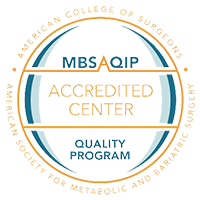Bariatric Surgery Webinar

Take the first step toward this life-changing surgery. Attend one of our free webinars.
Learn More
Medical experts consider gastric bypass surgery to be the most successful bariatric surgery for total weight loss and long-term maintenance. Is also has the lowest risk of complications. Also known as Roux-en-Y, gastric bypass is also the most frequently performed bariatric surgery worldwide.
Gastric bypass restricts the amount of food you can eat and limits the body’s ability to absorb calories. Paired with lifestyle changes, the surgery results in an average weight loss of 60 to 80 percent of excess body weight within one year.
At the University of Maryland Center for Weight Management and Wellness, our surgeon, Dr. Mark Kligman, has more than 15 years of experience in performing gastric bypass surgeries. And our team of weight loss specialists is here to support you both before and after the surgery.
The procedure bypasses most of the stomach and the upper small intestine, which is where some calories from food are absorbed.
During a gastric bypass, the surgeon creates a small pouch from the top part of the stomach, with the rest of the stomach sealed off. Then the surgeon divides the small intestine and connects the lower end to the newly created small stomach pouch.
Gastric bypass helps weight loss because:
UMMC gastric bypass patient, Sarah, changed her life. She now has a healthier lifestyle and even ran a marathon!
In addition to the lowest risk of complications, advantages of gastric bypass include:
Our surgeon performs only minimally invasive laparoscopic surgeries. In this approach, a tiny camera and surgical tools are inserted through much smaller incisions than traditional open surgery would require. The advantages of laparoscopic surgery include:

